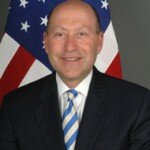The president of the Canadian Chamber of Commerce, Perrin Beatty, is in Orlando where he has been attending the Spring meetings of the US Chamber of Commerce. On Tuesday, he heads to Atlanta to speak to business audiences later this week about Canada-US issues, in particular the border and the proposed Keystone XL pipeline. I asked him a few questions about his meetings with US business leaders.
Q – At the meetings you’ve been attending, what has been the mood? What were people talking about?
A – The key issue is where we are going in terms of the economy. There is a lot of interest in terms of how the new Congress is shaping up, what are the mega-trends we are dealing with, what is happening with China, and the economic implications of events in the Middle East. Exactly the kind of issues you would hear discussed in Canadian Chamber of Commerce meetings.
Q – Are you picking up more optimism or pessimism on the economy?
A – Cautious optimism. People see things moving in the right direction but there is a recognition that global events are going to have an impact on the economy here and things are moving very quickly.
There is also the major challenge of the US structural deficit. It’s a challenge for the functioning of government. In Canada we aren’t faced with these issues. It really makes you aware of the size and scope of problems being faced here.
People are also very interested in what is happening at the state level. They really see Wisconsin as a straw in the wind of what we may see in other states as governments try to get state finances under control
The sense you get is if the provincial premiers or the prime minister on some days think they have big problems to deal with here, they would be well advised to look south of the border and see the magnitude of the issues in terms of the size of the debt and deficit problems at the state and federal level. There are very tough decisions to be taken in the US. If you compare the challenges we are facing in Canada, ours are relatively easy to deal with compared to those in the US. But we have a real vested interested in seeing the US succeed – the US is our best customer with 70 percent of exports. It’s important that they be healthy and continue to grow.
Q – How much awareness are you encountering on issues important to Canada, such as the border?
A- Inevitably, it’s an issue that plays more significantly in Canada. The challenge always is how do you get Canadian issues onto the agenda unless there is a crisis? On something chronic like the Canada-US border, it’s important to spend time educating people – and explain how states far from the border are being affected by through cost increases or job losses due to stickiness at the border. Canada is the biggest customer for 34 of the states.
And are we putting the resources needed to raise awareness of Canadian issues in the right place? We tend to over-emphasize Washington. In Washington, there is such a cacophony of voices competing to be heard. We would do better to focus outside of Washington—to get into the discussion through a back door by focusing on a particular community and talking about jobs. There is more receptiveness there. Often the best way into Washington is through the districts.
Q – In the discussions you’ve been hearing about the implications of events in the Middle East for the economy, does the subject of Canadian oil sands ever come up?
A—I’m the one for the most part who is raising it. [Americans] often don’t realize that Canada is the primary foreign source of oil. What is timely is that when I talk to people about [the proposed] Keystone XL [pipeline from Alberta to Texas], events in the Middle East have made it clear that the US is being held hostage to a region that is unstable, where countries are unfriendly to the US and it’s uncertain what uses energy revenues are being put to. The key for anyone I have spoken to is that to the extent we are able to displace oil from Middle East or Venezuela with Canadian crude, this is a matter of national security for the US and in the US interest. They also recognize that it could be a shot in the arm for the construction industry. I’ve been sharing the Department of Energy report that said oil from Alberta would displace oil from the Middle East. That is the single most important thing that the US can do to promote energy security.
Q – Are people you are talking to concerned about the environmental issues surrounding the oil sands and the pipeline?
A – Everybody understands you have to address the environmental issues seriously. But when they look at importing from Middle East and shipping it half way around the world, it’s pretty straightforward, that most environmentally sound way is by pipeline.
Q – What about the recent report raising concerns about pipeline safety?
A – People understand that pipelines are inherently safer than tankers and pipeline safety has continued to improve. If you look at what is most readily controllable and has the least environmental impact, clearly it makes sense to move it by pipeline.
Q – Have you heard anything recently that would suggest the State Department is leaning toward approving the pipeline?
A – Nothing new. The developments in Middle East add a note of urgency to resolving this issue and moving ahead. It’s dangerous for us to be so dependent for energy reserves on unstable sources of oil.
Q – For the past two years, the Obama administration has had a rocky relationship with the US Chamber of Commerce and has been called “anti-business.” What are you hearing at the meetings? What is the tone?
A — I think it’s improved. At least there is a dialogue. My sense is there is improvement there. People are looking for what will be the result of the dialogue. It’s not clear what the strategy of the administration will be. Will they move to the center? The people who are being rewarded are those who have taken most extreme positions. What the US needs to do in a split Congress like this one is to find a bipartisan solution to the problems – otherwise you get political theatre instead of solutions. What worries people is the prospect of a government shutdown.
Q – Canada went through a period under the Chretien government of dealing with large deficits and dealing with the long-term solvency of the Canada Pension Plan. Are there any lessons from the Canadian experience for the long term fiscal situation in the US?
A – Looking at Canada, what stands out is how quickly we were able to get deficit under control and start banking surpluses. The US is dealing with a structural deficit of a trillion dollars. This requires major changes. They are also facing a demographic time-bomb as baby boomers retire. They have to make difficult decisions that will get more difficult in the years ahead.
Q – Canada coped in part by cutting benefits and increasing contributions…
A – And also by reducing transfers to the provinces that were in better shape than the states are today. In the US you have a problem that many states have a dire budgetary situation. None of the Canadian provinces were in the shape at the time Finance Minister Paul Martin was taking tough decision. We had more maneuvering room. There is opportunity now for us to bring the budget into balance in five years. That’s not going to happen in the US.
What they will see here is the debt as a share of national income will continue to grow and squeeze out other areas of spending.
What it does for a Canadian spending time here is just to reinforce the scale of the issues the US is dealing with but also to underline the scale of the US economy – and that the American people are optimistic and forward-looking and there is a strong sense that best days are still ahead.
Q – Does it also emphasize the need to diversify trade away from dependence on the US?
A – We’ve been saying that for some time that it does not make sense to have 70% of eggs in one basket. We should diversify trade not to detract from our trade with the US but to grow our trade overall.
***
You can follow me on Twitter at luizachsavage

